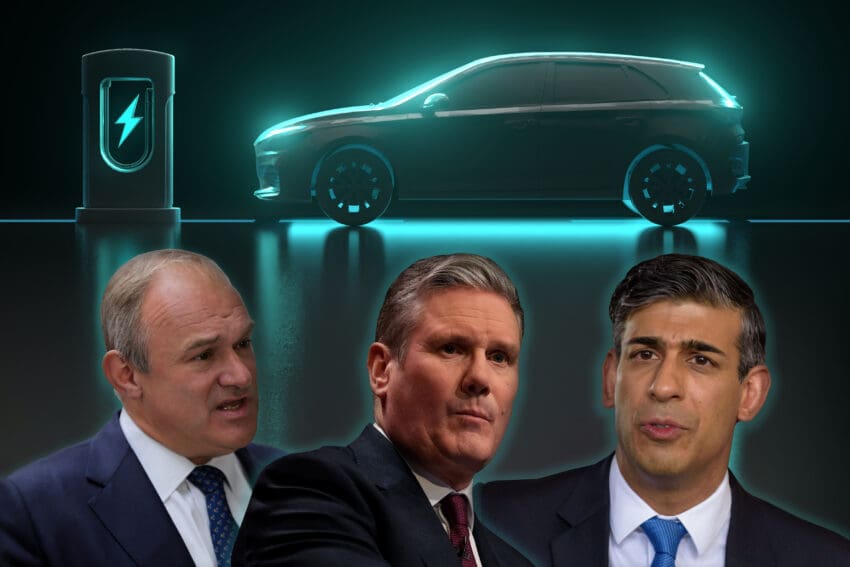General Election 2024 – what all the major parties have said about electric vehicles
Parties pledge everything from more chargers to scrappage schemes and new plug-in car grants as they try to attract voters.
With the General Election now less than a month away the UK’s major political parties have published their manifestos.
Understandably, issues such as social care, law and order, education and defence dominate the documents but most of the parties also acknowledge issues around transportation and the need to shift to electric vehicles.
Here, we break down each party’s manifesto statements on EVs and the supporting infrastructure, from reinstating the 2030 ICE ban to cutting tax on charging.
Conservatives
The Conservative manifesto is largely silent on the matter of electric vehicles.
In the last 12 months, the party has pushed back the planned phase-out of combustion vehicle sales from 2030 to 2035. However, it has also implemented the zero emission vehicle (ZEV) mandate, which requires 80% of a manufacturer’s vehicle sales to be zero emission by 2030.
The manifesto states that: “We stand ready to support domestic car manufacturers if there is evidence other countries are breaking global trade rules” – a reference to concerns around Chinese state subsidies for EVs exported to the UK and Europe.
Beyond that, the manifesto makes no new pledges around EVs. It simply notes: “We will support people to choose electric cars by ensuring our charging infrastructure is truly nationwide, including rapid charging and delivering the Zero Emission Vehicle Mandate to support manufacturers to safeguard skilled British jobs.”
The manifesto dismisses the idea of road pricing, often linked to EV uptake. A pay-as-you-go system has been suggested as a means to bridge the potential financial losses in fuel duty and vehicle excise duty as drivers move from ICE to electric cars. However, the manifesto states that the Conservatives will not introduce road pricing and will ban city mayors from implementing local schemes.
It also pledges to reverse the extension of London’s ULEZ.
Labour
Labour has said that it will reinstate the 2030 ban on sales of new combustion cars, which it says will give car makers ‘certainty’.
This would mean that from 2030 100% of car makers’ models would have to be fully electric or plug-in hybrids capable of a still-undefined ‘significant’ zero-emissions range.
Its manifesto also includes a pledge to aid buyers of used EVs by creating a standardised system for assessing and reporting the condition of a car’s battery.
Labour has pledged to ‘accelerate’ the roll-out of charging infrastructure as set out in the party’s automotive sector plan. Neither document gives precise details, numbers or timescales for this acceleration but Labour has said it will set binding targets for public charger roll-out as well as simplifying planning and grid connection rules to remove obstacles for infrastructure firms.
On the broader industry around EVs, the manifesto includes plans for £1.5 billion to support the development of new battery ‘gigafactories’, and a commitment to support apprenticeship schemes to address the current EV skills gap. There is also a promise to match electric vehicle research funding to government spending on aerospace R&D.
Liberal Democrats
Like Labour, the Liberal Democrats have said they will support the uptake of EVs through a series of new measures.
Key among these is a plan to reintroduce the plug-in car grant, which was removed from private car sales in June 2022. The manifesto doesn’t contain any details on what form a new PiCG would take but at the time of its removal, it offered buyers £1,500 towards the cost of a new electric car costing less than £32,000.
The Liberal Democrats have also said they will reverse the extension to the 2030 ICE ban. The party’s manifesto states a commitment to “restoring the requirement that every new car and small van sold from 2030 is zero-emission”.
The Liberal Democrats are also the only party to address concerns around EV charging costs, with the manifesto stating that the party would cut VAT on public charging from 20% to 5% to bring it in line with domestic rates. It also says that all charge points will be required to work with bank cards.
Like Labour, the Lib Dems have said they will accelerate the roll-out of public charging, including residential on-street charging and ultra-rapid en-route devices. However, there are no details on the speed and scale of this.
They have also said they will support the upgrade of the National Grid and a ‘step-change’ in local grid capacity to support the energy needs of EV charging.
Green Party
The Green Party wants to accelerate the ban on new ICE vehicle sales and eventually ban any non-EVs from the roads, stating: “Within a decade we want to see all petrol and diesel vehicles replaced by electric vehicles.”
Its manifesto states an aim of moving the ban on new ICE cars forward to 2027 and an outright ban on any petrol or diesel vehicles on UK roads by 2035.
It plans for an ‘extensive’ scrappage scheme to encourage drivers to switch from ICE to EVs, pledging up to £5 billion of annual funding for the scheme by the end of the next parliamentary term.
It also promises more government support for “ordinary car users and small businesses” to replace their vehicles as diesel and petrol are phased out, although there are no details about what form this support might take.
The manifesto also says the party favours the introduction of road pricing to address the decline in fuel duty revenue as EV uptake accelerates.
Plaid Cymru
Wales’s national party doesn’t make any reference to electric vehicles in its manifesto.
It focuses on public transport, noting only that it wants to persuade people to make less use of their cars.
It also states the party’s support for clean air zones in high-population areas to address pollution concerns.
SNP
The Scottish National Party’s main manifesto pledge on EVs is to remove VAT from on-street electric vehicle charging. This goes a step further than widespread industry calls to cut it from 20% to 5% in line with domestic rates. Aware that it can’t win enough seats to form a majority, the manifesto also says that the SNP will press the next Westminster government to strengthen incentives to purchase cleaner vehicles. It says the UK should copy France and establish a new £500 million low income EV leasing fund to enable 50,000 EV leases a year to benefit low income families.
Reform
The Reform Party has taken an opposing position to most other parties when it comes to electric vehicles.
Its manifesto states that it would scrap the planned 2035 ban on petrol and diesel cars and remove the ZEV mandate requiring car makers to sell EVs.
It also says it would legislate to ban all ultra-low emissions zones, designed to keep the most polluting vehicles out of city centres.






